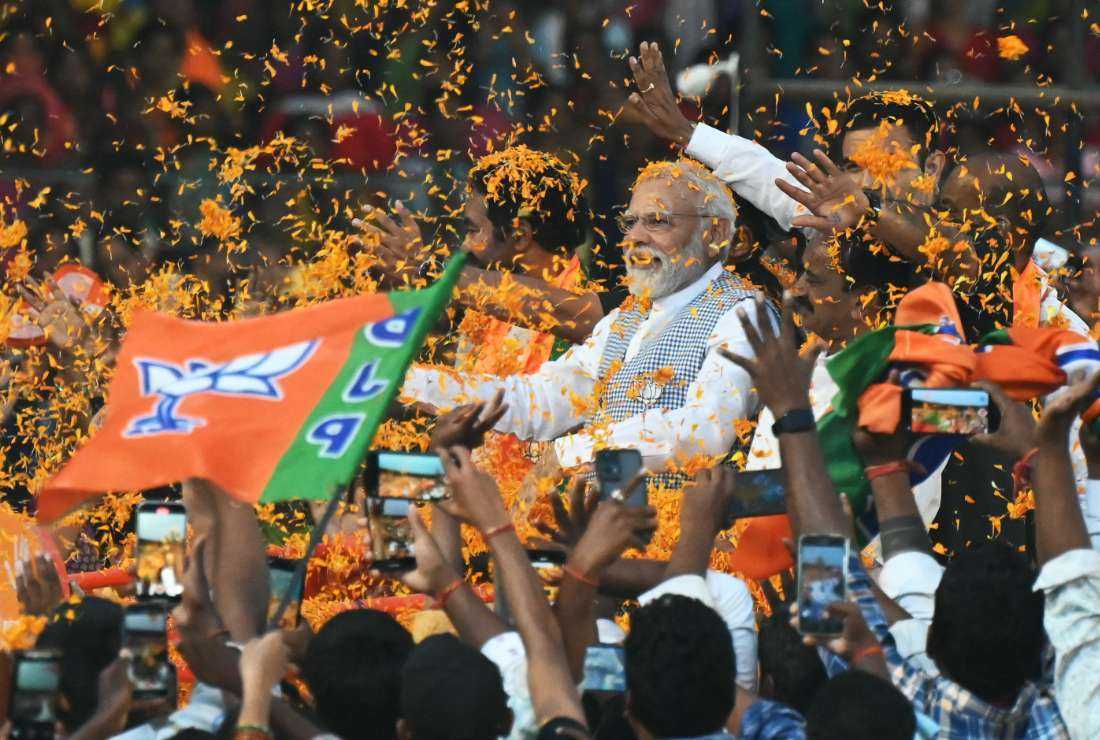
Indian Prime Minister Narendra Modi (center) attends a Bharatiya Janata Party campaign meeting in Hyderabad on Nov. 7, 2023. (Photo: AFP)
The Uniform Civil Code Bill was passed after two days of debate on Feb. 7 by the Uttarakhand state assembly through a voice vote amidst chanting of ‘Jai Sri Ram’ (Hail Lord Ram) and other pro-Hindu slogans.
The Uttarakhand government has fulfilled the demand of the Rashtriya Swayamsevak Sangh (RSS), an umbrella organization of Hindu groups, Christian and Muslim leaders said.
The RSS has long espoused a common civil code for the entire nation of 1.4 billion. It has been one of the electoral promises made by the ruling Bharatiya Janata Party (BJP) of Prime Minister Narendra Modi.
India does not have uniform laws for personal matters such as marriage, divorce, adoption and inheritance. Instead, it has a patchwork of different codes based on the customary traditions of different communities and faiths.
The rights of women, children, and families across India vary considerably depending on which code they fall under.
Goa located on India’s west coast is the only part of India with a common code, introduced when it was a Portuguese colony.
Many hardline Hindu politicians, jurists and reformists have described these custom-based codes as regressive and have lobbied for a code that would apply to all Indians equally.
However, the legislation does not provide any kind of promised uniformity, said A.C. Michael, president of the Federation of Catholic Associations of the Archdiocese of Delhi.
“A civil code that divides on the basis of caste, creed, and religion cannot be called uniform,” he told UCA News on Feb. 8.
Michael said that instead of marching towards “a more modern civil code,” the government is trying to make lives more difficult for the minorities and discriminated sections of society like the indigenous people, Dalits and women.
“It discriminates against those in live-in relationships,” he said referring to Uttarakhand’s new law which requires unmarried cohabiting couples to notify officials about their relationship.
“What is worse is that it gives a free hand to any third party to file a complaint against such consenting adults,” he added.
Bishop Vincent Nellaiparambil of Bijnor in neighboring Uttar Pradesh state said the church was examining the impact of the new bill on Christians.
“If the uniform civil code does justice to all citizens, we welcome it,” the prelate added.
However, Muslims fear it would encroach on their religious laws, which is against India’s secular constitution.
Among the many clauses in the new law is a proposed end to polygamy.
Muhammad Arif, chairman of the Centre for Harmony and Peace, an NGO based in Uttar Pradesh, told UCA News: “India is known for its unity in diversity. So, bringing everything under one umbrella will be difficult and we don’t agree on it.”
He said governments cannot change people’s “food habits, dresses, and age-old traditions.”
“What we need is uniformity in sharing equal opportunities when it comes to education, employment and overall development,” the Muslim leader observed.

